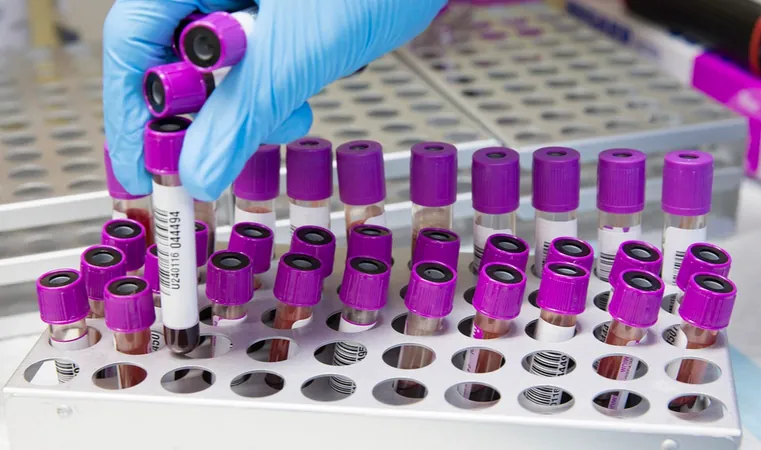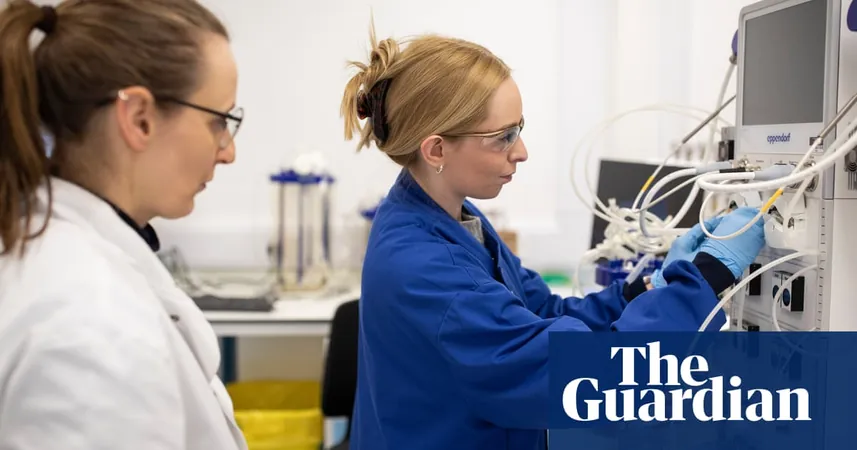
Revolutionary Blood Test Could Change How We Detect Cancer – Here’s What You Need to Know!
2025-01-19
Author: Arjun
Introduction
In a groundbreaking advancement for cancer detection, scientists have unveiled a new blood test named TriOx that has shown promise in diagnosing multiple types of cancer, even at their early stages. As we all know, early detection is crucial for improving treatment outcomes and survival rates in cancer patients, and this innovative approach could drastically transform how we approach cancer screening.
Traditional Detection Methods
Traditionally, cancer detection methods largely relied on invasive procedures and focused primarily on specific types of cancer. Liquid biopsies, which examine circulating tumor DNA (ctDNA) in blood samples, have emerged as a potential solution. However, the methods used have often been limited in scope, typically identifying only a handful of cancer types via standard genetic sequencing.
TriOx: A Game Changer
TriOx breaks new ground by employing a sophisticated technique known as whole-genome TAPS (TET-Assisted Pyridine Borane Sequencing) combined with advanced machine learning algorithms. This powerful combination enables the test to analyze both genetic features and epigenetic modifications of DNA, including key methylation patterns that are indicative of cancer presence.
Expert Insights
According to Professor Anna Schuh from the University of Oxford, who is leading the research, “Our new test brings together the best of cutting-edge science and machine learning. Although this test is still early in development, we believe it has the potential to improve survival rates for millions worldwide by enabling routine blood tests that catch cancer earlier when it’s easier to treat.”
Initial Trials and Results
TriOx has shown impressive results in initial trials. It was evaluated using blood samples from individuals diagnosed with various cancers—specifically breast, colorectal, esophageal, ovarian, pancreatic, and renal cancers. Remarkably, the test demonstrated a sensitivity of 94.9 percent and a specificity of 88.8 percent, accurately distinguishing between those with and without cancer.
Significance of the Research
Dr. Dimitris Vavoulis, co-corresponding author and expert at Oxford's Wellcome Centre for Human Genetics, expressed the significance of this advancement, stating, “Many cancers, such as pancreatic and ovarian, often go unnoticed until they’ve reached advanced stages, making treatment more challenging. Our non-invasive approach could revolutionize routine cancer screening, allowing for quicker, more convenient tests that empower patients and healthcare providers to stay ahead of the disease.”
Future Directions
While TriOx shows great potential, researchers emphasize that it must undergo further validation with a larger pool of patients and explore additional cancer types. However, the vision is clear: one day, a simple blood draw could potentially replace current, more invasive cancer screening methods, making early detection accessible and routine for everyone.
Conclusion
Stay tuned for further updates as this promising technology heads towards clinical trials. The future of cancer screening may be on the verge of a major transformation!

 Brasil (PT)
Brasil (PT)
 Canada (EN)
Canada (EN)
 Chile (ES)
Chile (ES)
 Česko (CS)
Česko (CS)
 대한민국 (KO)
대한민국 (KO)
 España (ES)
España (ES)
 France (FR)
France (FR)
 Hong Kong (EN)
Hong Kong (EN)
 Italia (IT)
Italia (IT)
 日本 (JA)
日本 (JA)
 Magyarország (HU)
Magyarország (HU)
 Norge (NO)
Norge (NO)
 Polska (PL)
Polska (PL)
 Schweiz (DE)
Schweiz (DE)
 Singapore (EN)
Singapore (EN)
 Sverige (SV)
Sverige (SV)
 Suomi (FI)
Suomi (FI)
 Türkiye (TR)
Türkiye (TR)
 الإمارات العربية المتحدة (AR)
الإمارات العربية المتحدة (AR)